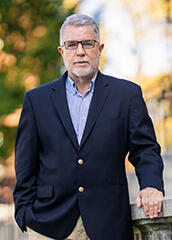
James Honan, Senior Lecturer on Education at HGSE, has taught courses on nonprofit management and finance at Harvard since 1991 and additionally has 15 years of online teaching experience at Harvard Kennedy School (HKS) and the Harvard Graduate School of Education (HGSE). When COVID-19 forced all teaching and learning at Harvard to move online, Honan and his teaching team were uniquely positioned to adapt his in-person courses for a new modality. With a robustly developed teaching toolkit across residential and online instructional formats, Honan currently teaches two versions of his
Strategic Finance for Non-Profit Leaders course—one to residential students and one to the first cohort of HGSE’s fully online Ed.M. program, the
Online Master's in Education Leadership. Honan and his longtime teaching team offer the online versions of the courses in one of HGSE’s state-of-the art studio classrooms, which features multiple large video screens, voice-activated cameras, and other technology enhancements to support effective online pedagogy.
...
Read more about Adapting residential courses for online cohorts